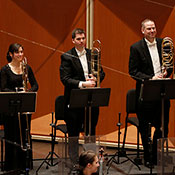
MSO Musician Spotlight: John Thevenet
David Lewellen
PUBLISHED
Tagged Under: 2022.23 Season, MSO Musicians
John Thevenet took a lot of auditions before he won the Milwaukee Symphony’s opening for bass trombone in 2010.
After he aged out of the New World Symphony, the prestigious training orchestra for young professional musicians in Florida, he made ends meet for nearly a decade by playing for the Naples Symphony and freelancing in other Florida cities. He was also traveling the country to take auditions for full-time jobs, “but I had audition anxiety. I would show about 30 percent of what I had.”
In the semifinal round in Milwaukee, he nailed all of the hardest excerpts, including a passage from Zoltan Kodaly’s “Hary Janos Suite” that goes up to the top of the bass trombone’s range – even though “that one note has eliminated me from other auditions.” But then principal trombone Megumi Kanda “asked me to do it again, and do it differently. And I’m like, ‘I got it once. You want me to do it again?’ It was a little frustrating. But I did it, and I nailed it.”
In the final round, the candidates usually play with other members of the section. “That is my greatest gift as a bass trombonist,” Thevenet says. “Every section is different. You have to listen to pitch, tone, volume – that’s a big one – and when and how the principal starts notes and ends notes. You definitely don’t want to start before the principal, or release later.”
Kanda agreed that at the audition, “it was pretty obvious that if we wanted a good section, John was the clear choice. He was really aware of his surroundings, and he knew exactly how to fit in.” In the years since then, she said, “we have musical conversations, where you do something and you don’t have to say anything, but someone hears it and copies you. With John, it’s always that way.”
“All bass trombonists start out as pigs,” Thevenet says with a grin. “How quickly you stop being a pig determines how far you go.”
When told of that comment, Kanda laughed and said, “He calls it pig, I call it meathead. And in the audition, I set a couple of traps to catch the meatheads.” Those players would blast their way through Wagner’s overture to “Tannhauser,” for instance, but the MSO was looking for musicians who “focus on phrasing and sound instead of volume.”
Thevenet started trombone as a sixth grader in Dallas because it was the only brass instrument left in stock. Then in ninth grade, “my teacher said, ‘You like playing loud and you don’t mind making a fool of yourself. Do you want to try bass trombone?’” He did – and then his path was set as a junior, when he listened to Tchaikovsky’s Fourth Symphony and thought, “Oh my God, classical music is so awesome.”
He was 39 when he won the Milwaukee job, but he says, “I think your mid-30s is when you peak on an instrument. Not that you decline after that, but that’s when you really put together ability with understanding.”
From the audience, the bass trombone looks similar to the others in the section. But the bell is slightly larger, and in addition to the slide, it has two valves operated by the left thumb and middle finger, which extend the instrument’s range downward.
That also makes a lot of passages simpler to play, with less slide movement. “It’s like a cheat code, if you know how to use it,” Thevenet says. He can play much of the famous melody of Wagner’s “Ride of the Valkyries” without moving his slide, while the other trombonists’ arms get a workout.
Thevenet lives in Grafton with his wife, Mylene, and their 5-year-old daughter. His parents also moved to Grafton several years ago to be part of their granddaughter’s life. Even so, child care logistics are complicated. He says, “I learned from Megumi,” who has three school-age children with her husband, hornist Dietrich Hemann. “For years I’ve seen her backstage with her calendar, coordinating schedules.”
In middle age, with family and roots in the area, Thevenet says he is done auditioning. But he finds playing in the MSO is “really refreshing. It’s the easiest section I’ve ever played with, the least demanding or controlling. Everyone is good, but they don’t have to let everyone else know about it.”



